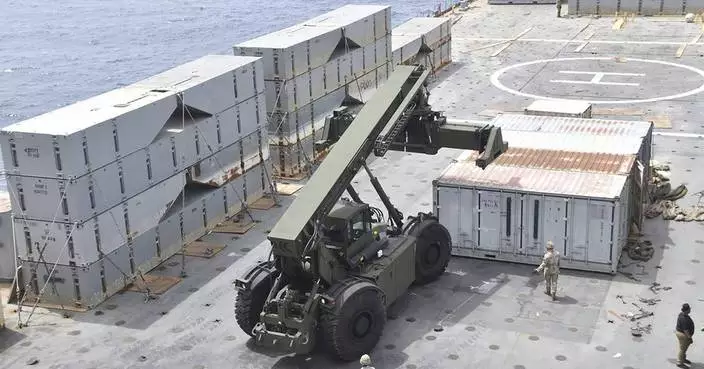A dragon winds around a cherry tree in the tattoo across MJ Hegar's arm and back, over the shrapnel wounds she had, at one point, not wanted to see with her young children around.
But nine years after being shot down in Afghanistan, then winning a lawsuit against the federal government, writing a book and now running for a Texas congressional seat, Hegar isn't hiding much anymore.
"I carry my service with me wherever I go," Hegar said in a telephone interview near her home in Round Rock, outside Austin. "We don't see my family and my childhood and my service as different chapters. It's all a package deal."
Hegar is part of a crop of female veterans running for Congress in this year's midterm elections. Almost all Democrats and many of them mothers, they are shaped by the Sept. 11 attacks and overseas wars, including the longest war in American history. Many are retiring from the military and looking for another way to serve the country.
They're part of a record number of women running for seats in Congress, but in certain ways, they are a class apart.
The female veterans claim expertise in national security and veterans issues, with a track record of thriving in institutions dominated by men. Regardless of party, they cast themselves as the antidote to bitterly partisan politics — describing themselves as "mission-driven" and trained by the military to work toward a common goal.
"I flew 89 combat missions as a U.S. Marine. My 90th mission is running for Congress to take on politicians who put party over country," said Kentucky Democratic candidate Amy McGrath, the first female Marine to fly an F/A-18 in combat.
The increase in candidates with military experience is no accident, and the hopefuls are expected to be propelled by Democratic luminaries. Former Vice President Joe Biden, for example, is expected to campaign for McGrath, among others, according to officials close to them who spoke on condition of anonymity because the schedule is not set.
Two Democrats — Massachusetts Rep. Seth Moulton, a retired Marine Corps captain and Bronze Star recipient, and Illinois Sen. Tammy Duckworth, who lost her legs and partial use of an arm when her helicopter was shot down by a rocket-propelled grenade in Iraq — have been instrumental in recruiting veterans to run for office.
Moulton said female veterans in his party carry a particular authority when talking to voters concerned about President Donald Trump's leadership.
"It's the year of the woman, but it's also the year of yearning for bringing integrity and honor back to politics," Moulton said. "We need Democrats with the credibility to tell people what's really going on."
The women are hardly the first to use their military service to their political advantage — men have been doing it for decades.
One of the traditional knocks against female candidates is "they aren't tough enough, they aren't strong enough, and they might not have the leadership skills," said Debbie Walsh, director of the Center for American Women and Politics at Rutgers University.
Not female candidates who are veterans, particularly of combat.
"They kind of automatically get that kind of respect as leaders; it's well-earned," Walsh said. "It's such a logical next step for people who are committed to this country and are committed to service."
But their campaigns highlight a set of political concerns specific to female veterans.
The candidates acknowledge that their extraordinary stories of trailblazing military careers could make it difficult for some voters to relate to them. Will they come off as too tough or hawkish? Is it possible for any candidate, male or female, to overemphasize his or her military background in the post-9/11 era?
McGrath, who retired as a lieutenant colonel, opened her campaign with an online video in which she wears a bomber jacket, a fighter jet in the background.
McGrath sees herself as a bridge to male voters who "sort of see women as being weaker," she said in a telephone interview. "But yeah, I have to make an effort to reach out to women and make sure that they're not scared, or think that I'm too militant."
Out came a 30-second spot that mentioned the 89 combat missions — but focused on McGrath taking her three children to the pediatrician.
"I'm Amy McGrath and I approved this ad," she says, as her young son takes off down a hallway with his pants down. "Because I'd like to see the other guys running deal with this."
She upset popular Lexington Mayor Jim Gray in the Democratic primary and will take on Republican Rep. Andy Barr in November, a closely watched race considered competitive in a district Barr won by 22 points in 2016. Poised for the different calculus of the general election, Barr last week released an ad quoting McGrath saying of herself, "Hell yeah, I'm a feminist" and calling herself "a progressive."
"Seriously? Is that all you got?" McGrath retorted in a video response, sharing the screen once again with a fighter jet. But this time, she traded her bomber jacket for a denim one.
Much of Hegar's story was already public by the time she decided to challenge Republican Rep. John Carter in the Austin-area district, so she went for the full reveal — tattoos and all.
Her video, "Doors," features the door of the helicopter in which she was shot down on her third tour of Afghanistan as a combat search and rescue pilot. Her medals, including a Purple Heart, play a role, as does Hegar's 2012 lawsuit against the federal government that forced it to repeal the ban on women in combat.
The spot also features an intimate detail: One of Hegar's first memories was of her father throwing her mother through a glass door.
"That's been one of the most difficult transitions for me, is talking about myself more," Hegar said. "I hope that they take away that we have to start putting our faith in people who have a history of putting other people first, fighting against intimidation and bullying, and trying to do the right thing."
Air Force veteran Gina Ortiz Jones, the Democratic nominee for a House seat in West Texas, hopes her active military duty and intelligence work will "neutralize this perceived strength" of Republicans as strong on security issues.
That could be important in the race for the San Antonio-area seat, currently held by Republican Rep. Will Hurd, a former CIA operative. Ortiz Jones supports single-payer health insurance, a position that could be considered too liberal for the district.
"'Liberal' isn't a word that is normally used to describe my work in national security," she said.
If these women win, they will join an exclusive club in Congress.
Just 19 percent of lawmakers are veterans — the same percentage that are women. Only four members are both: Sens. Joni Ernst, R-Iowa, and Tammy Duckworth, D-Ill.; and Reps. Martha McSally, R-Ariz., and Tulsi Gabbard, D-Hawaii.
"It kind of reminds me of a fighter squadron, with so few women," said McSally, a retired Air Force veteran who was the first woman to fly in combat and is now running for U.S. Senate.
All the candidates have stories about being among the only women working among men and have used their platform to speak out about abuses in the military.
McSally told The Wall Street Journal in April that she was pressured into having sex in high school with a coach and that she became an Air Force pilot in part to regain a sense of power. But even there, she told the paper, she had "similar, awful experiences in the military on the spectrum of abuse of power and sexual assault." She did not elaborate.
Pennsylvania's Chrissy Houlahan, a retired Air Force officer and now a congressional candidate, said she cringed more than once when a male colonel "used blonde jokes" to introduce her for presentations to superior officers.
"I definitely felt some overt sexism," she said.
New Jersey's Mikie Sherrill is a former helicopter pilot and prosecutor whose time at the Naval Academy dovetailed with the Tailhook sexual assault scandal in the Navy and Marine Corps. In the 1990s, she said, speaking out when she felt sexually harassed "would really have impacted the way I was treated in the squadron."
But these days, with a generation of women retiring from the military and a record number running for Congress, "it's become a lot easier to talk about these things," she said.
Follow Laurie Kellman at https://twitter.com/APLaurieKellman and Barrow at https://twitter.com/BillBarrowAP










